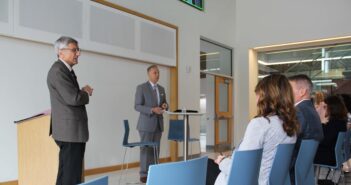As the deadline for Lehigh students to declare themselves “fully remote” or not has come and passed, the chaos and confusion of the past two weeks as Lehigh reversed its fall 2020 decision may be winding down as the start of classes draws near.
But not for Brian Lucas, ‘22, who described his fall plans as “in limbo.”
Lucas, who receives a large chunk of his tuition paid through financial aid, said if just one of his housemates at his residence on Montclair Avenue chooses to stay home and wants out of the lease, he may not be able to afford his rent. And with unknowns surrounding the viability of his work-study job, Lucas is left with an unclear financial picture.
But even if he opted for the fully remote option, which would grant him a 10 percent discount on tuition and bar him from access to campus facilities except the Health Center, Lucas wouldn’t be saving a dime.
That’s because students on need-based financial aid — approximately 2,000 students, or 40 percent of the student body, according to Jennifer Mertz, the director of financial aid — do not see a decrease in their “expected family contribution” by opting for the discount. Instead, the discount would allow Lehigh to pull back on the grants it had awarded to that student, since now the student would need less aid with the decreased cost.
“The whole idea of this being a discount is kind of funny,” Lucas said. “Lehigh is not the only university dealing with financial aid or tuition pricing difficulties, but it’s a little bit of a hyperbole to call this a discount.”
What’s more, Lucas felt he didn’t have all the information available to him to make a sound decision on whether to go fully remote or not.
“I guess the biggest thing that I’m wondering now is they say campus facilities will be open, and I’m still not entirely sure what that means,” he said. “I don’t even know what I would be missing out on. I’m still not sure what facilities would even be open for people that would be nearby.”
Lehigh announced its decision to limit on-campus housing mostly to first-year students in single-person dorm rooms, and said access to campus facilities like the libraries would be “limited.” A survey then was sent to students on Aug. 3 in which they had the option to select by Aug. 7 how they plan to study this semester: fully remote, with the 10 percent tuition discount and no access to facilities, or not — which would allow them to attend classes in-person if their professors chose to offer that.
The university made its preference clear. However, nowhere in that Aug. 3 email does Lehigh spell out that students on financial aid will not pay any less by selecting the fully remote option. The policy does appear far down on the university’s COVID information page under the section labeled “Tuition and Financial Aid.”
“I’ll say I don’t think they have been effectively communicating.”
-Brian Lucas, ’22
“All students, including first-year students, are encouraged to consider the ‘fully remote’ option for the fall semester, and we have confidence that remote learning will offer students a rigorous academic experience, allowing them to make progress in their degree plans,” the university wrote in its Aug. 3 email.
And Pat Johnson, the vice president of Finance and Administration, made it clear in an email to The Brown and White about why Lehigh is encouraging that option.
“The university feels that students would be safest at home, at least for this semester,” Johnson said. Later in the email, though, Johnson wrote Lehigh thinks “we can manage the risk for a limited number of students on campus based on the facts that we know about COVID at this point.”
When asked if Johnson felt the university’s communication was disingenuous since it is encouraging the fully remote option that would save the university money on financial aid costs, but would not save families money who receive financial aid, she said Lehigh has “made investments in online learning and feel that the quality of instruction is equal to in person.”
“I’ll say I don’t think they have been effectively communicating,” Lucas said. “I understand that it’s hard for them, but with that being said I still don’t feel like they’ve been doing a good job. We don’t necessarily know when to anticipate details so the fact that they kind of dropped this bomb on us when they did when people were making plans — that’s really the big issue I have is we’re all planning a semester when we don’t understand what’s going on with it. It’s a whole lot of, ‘I don’t know.’”
Mertz said those students on financial aid will not pay less under the tuition discount because the university is “already meeting need.” Mertz added her staff has been working with families who experienced a substantial financial hardship resulting from the pandemic to adjust their expected financial contribution.
She gave the example that if tuition goes up one year, as it typically does, most families’ expected contribution will stay the same, but aid will increase since the need increased. In this instance, if a student’s tuition decreases by selecting the fully remote option, a families’ expected contribution might stay the same, but the need will now be less since the cost is less — allowing Lehigh to pull back on aid but not necessarily reduce the expected contribution.
Other schools are treating financial aid recipients the same way this semester, Mertz said. Lafayette is offering the same policy of a 10 percent discount for fully remote students.
Emily Landgren, ‘21, receives financial aid and said she won’t be taking the fully remote option. She is hoping to access studio space and school computers for her architecture program, and doesn’t feel the remote option helps her parents “financially enough to justify giving up the benefits that having access to campus has.”
Landgren also felt uninformed about the tuition discount because of broader concerns she has about where that money goes. While she is aware tuition cuts have impacts on faculty and staff salaries and wants to support professors and cleaning and management personnel, Landgren said she doesn’t feel so inclined to support someone’s salary of “hundreds of thousands of dollars.”
Overall, she said, she’s confused.
“The fact that I don’t have enough answers to form my opinion tells me that Lehigh isn’t being transparent enough,” Landgren said. “While, sure, they could be doing worse, they should be striving to be good, not just good enough.”
Communication has been a sticking point throughout the evolving situation. Mertz and Johnson said the university is doing its best with constantly changing information.
Yet Mertz is aware of the criticism — and said it “hurts.”
“It has been really really hard because we care,” Mertz said. “We pour our heart and soul into the work we do, but only to get torn apart on social media. I’m a human and we care so much into helping these students, so only hearing negative — it hurts, it hurts.”
She said criticism that the tuition discount policy only benefits the wealthiest families at Lehigh is unfounded because families who pay full price “feel the brunt” in almost every other scenario when tuition increases. Mertz said those families are the ones “essentially subsidizing the students on financial aid.”
“We’re doing what we can, we’re working nonstop right now, we’re adjusting aid, we’re having a lot of conversations with students,” she said. “It’s been hard but the staff is so fantastic and caring.”






Comment policy
Comments posted to The Brown and White website are reviewed by a moderator before being approved. Incendiary speech or harassing language, including comments targeted at individuals, may be deemed unacceptable and not published. Spam and other soliciting will also be declined.
The Brown and White also reserves the right to not publish entirely anonymous comments.
1 Comment
While I am not particularly impressed with how student affairs in general has been handling this, the financial aid office deserves the least of the retaliation.
I have spoken and worked with Mrs. Mertz and financial aid throughout my entire college career. She and her office have always been willing to bend over backwards to help not only me but other students who were in a bind.
I concede that the “10% discount” deserves criticism. However, I do feel that this falls more on student affairs and their lackluster ability to keep the larger Lehigh community on what the plans were to be for this Fall. That is, the financial aid office, and the bursar office to an extant, are at the mercy of a slow, bloated beast in form of office of student affairs and office of academic affairs.